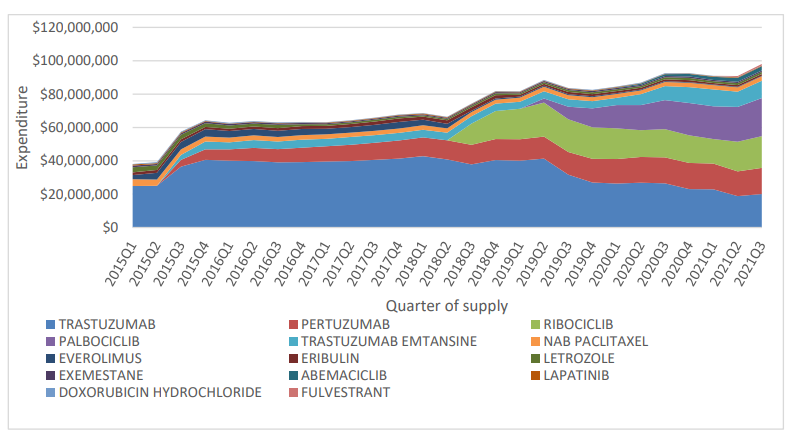A PBS review of locally advanced and metastatic breast cancer treatments has found that uptake of palbociclib has been far higher than predicted and the drug is already costing taxpayers more than any other breast cancer medication.
The cost blowout comes in spite of the drug still being prescribed to less than 3% of breast cancer patients by late 2021, according to the PBAC’s drug utilisation sub-committee (DUSC).
Ribociclib, another protein kinase inhibitor on the PBS, had the third highest total cost, despite accounting for under 2% of all breast cancer scripts.
The sub-committee found hormone blocking therapies such as letrozole remained by far the most common breast cancer drugs listed on the PBS. This reflected the fact that hormone receptor positive breast cancer accounting for two-thirds of breast cancer cases.
But expenditure on these hormone modulating medicines (anastrozole, letrozole, exemestane, tamoxifen and fulvestrant) had remained stable since 2017, mainly due to price reductions, it said.
At the same time, PBS spending on chemotherapy and immunotherapy listings had been in decline, largely from price reductions applied to trastuzumab.
Nevertheless, the total taxpayer cost of breast cancer drugs had risen dramatically from under $40 million in the first quarter of 2015 to almost $100 million by Q3 of 2021.
Almost half (45%) of this increase was the result of PBS listings for protein kinase inhibitors, namely ribociclib in 2018 and palbociclib the following year, the committee said in an analysis published earlier this month.
Total PBS expenditure on BC therapeutics
Source: Department of Health
The full extent of the blowout was redacted from the publicly-released report, which also stressed confidential arrangements between drug companies and the federal government meant actual cost may have differed from published prices.
However, utilisation of palbociclib had been “significantly greater than predicted”, with 1,540 patients supplied in its first year of listing and 2,261 in its second, the report said.
“Expenditure on protein kinase modulators has significantly increased since ribociclib and palbociclib were listed on the PBS,” it said.
“Of all BC drugs, palbociclib has highest PBS expenditure based on the published list prices, whilst ribocliclib was third highest, just fractionally lower than trastuzumab.”
Total breast cancer prescriptions had risen between 6% and 8% annually since 2015 and, as of late 2021, there were some 93,000 patients on a PBS-funded medication for breast cancer, the report said.
Palbociclib’s manufacturer Pfizer declined to comment on the report.